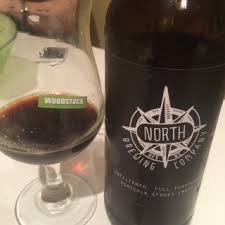 In a recent post I look at the newer breweries in the Nova Scotia craft scene. One of the missing pieces at the time was an unopened bottle of North Brewings’ Belgian Milk Stout. I was intrigued by this beer from the moment I saw it on the shelf. I don’t think I have ever seen a blending of milk stout and Belgian influences. I was curious.
In a recent post I look at the newer breweries in the Nova Scotia craft scene. One of the missing pieces at the time was an unopened bottle of North Brewings’ Belgian Milk Stout. I was intrigued by this beer from the moment I saw it on the shelf. I don’t think I have ever seen a blending of milk stout and Belgian influences. I was curious.
I got around to opening it the other day – after it had at least a few days to settle from its travel shock. I will admit in the back of my mind I was hoping for something like Hercule Stout, which is a highlight of Belgian style bending for me. However, my brain reminded me Hercule is more of a tropical/imperial stout in its base beer.
Well, the beer starts impressively. For appearance my notes simply read “black, black, black”. It builds a tall, thick and rolling dark tan head. It seems substantial enough to rest a coin on it. The aroma wafts as mocha, dark coffee, licorice with a blanket of mustiness and dark earthy yeast spice.
The taste starts noticeably sweet. It is a lactose sweetness (appropriately) accented by some mocha chocolate and dark fruit. I find the middle gets a bit weird with a dank silkiness and tinge of tartness. The Belgian character dominates the latter stages of the beer, coming across as a musty, earthy overlay. The linger is medium roast coffee mixed with a dirty spoon, but in a good way (if that makes any sense at all).
The yeast doesn’t come across like pepper or phenols as one would expect in a straight up Belgian (is there such a thing?), but more of a root cellar character. You can tell it has Belgian yeast but it reacts in an unexpected way. It makes the beer seem a bit oxidized and more earthy. I can’t quite decide if it is due to the interactions of the sweet malt base and the yeast , if they use a strain that seems earthier and mustier, or they did something else to the beer that I haven’t read.
So, it turned out not to be all that much like Hercule Stout after all, which I guess shouldn’t really surprise me. They are simply different beer (alcohol content and the residual sweetness being two differences). North’s stout went a different direction. The yeast and the roast do fit well together, just not in the way I was expecting. It draws out the mustiness of the beer more than it adds a phenolic edge. It is more subtle than I expected. A casual drinker might not even know that it is Belgian inspired, but it clearly is.


Leave a Reply